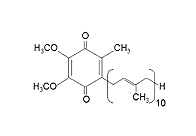Co-enzyme Q10 versus heart failure
A high daily dose of the co-enzyme Q10 increases the survival chances of people suffering from heart failure by 36 percent. This was discovered by the Danish cardiologist Svend Aage Mortensen. His research, in which 400 test subjects participated, appeared in JACC: Heart Failure.Q10
Q10 is an antioxidant that is naturally present in the body. It plays a role in energy production in the cells. When nutrients are converted into energy molecules Q10 ensures that the electrical charges released don't cause damage. Scientists believe that a too low concentration of Q10 in brain and heart cells is a contributing factor to the onset of brain diseases, such as Parkinson's, and heart failure.
Heart failure
Mortensen has been studying the positive effects of Q10 on heart failure since the 1990s. When heart failure occurs the heart is not capable of contracting properly and, as a result, parts of the body don't get enough oxygen or nutrients. A rare form of heart failure is hypertrophy of the heart muscle, which occurs in strength athletes who use growth hormone and anabolic steroids. In this group the muscle tissue in the heart becomes so enlarged that not enough blood can 'fit' into the heart muscle. Q10 supplementation may offer protection against this.
Study
Mortensen and his colleagues performed experiments as part of the Q-SYMBIO study, in which 420 people from nine different countries with serious heart failure took part. Some of them only felt healthy when resting; others were affected by their complaint even when resting. For a period of two years, 202 test subjects were given three doses of 100 mg of the Q10 co-enzyme every day, spread over the day.The remaining 218 test subjects were given a placebo for two years.
Results
Throughout the experimental period, the heart condition of the Q10 group improved: their complaint became less serious. This did not happen in the placebo group.
During the experimental period, a quarter of those in the placebo group experienced a major adverse cardiovascular event [MACE]. Only 14 percent of the subjects in the Q10 group suffered a similar fate. A major adverse cardiovascular event included hospitalisation as a result of deterioration in the condition, or death.
[FONT="]
[/FONT]


[FONT="]
[/FONT]
In the placebo group 17 percent of the subjects died. In Q10 group the figure was 9 percent. This means that Q10 supplementation increases survival chances by 36 percent.
Conclusion
"CoQ10 is the first medication to improve survival in chronic heart failure since ACE inhibitors and beta blockers more than a decade ago and should be added to standard heart failure therapy", said Mortensen. [sciencedaily.com May 25, 2013]
"Other heart failure medications block rather than enhance cellular processes and may have side effects. Supplementation with CoQ10, which is a natural and safe substance, corrects a deficiency in the body and blocks the vicious metabolic cycle in chronic heart failure called the energy starved heart."
Mortensen suspects that people on statins may also benefit form Q10 supplementation. Statins block the production of Q10. He recommends that statins users first discuss with their physician or pharmacist before starting to take Q10.
Q10 supplementation stimulates blood coagulation, and can therefore reduce the effect of anti-coagulants. Q10 also causes the body to breakdown substances like theophylline more slowly, which can lead to an increased risk of side effects.
Source:
JACC Heart Fail. 2014 Dec;2(6):641-9.

|
Q10 is an antioxidant that is naturally present in the body. It plays a role in energy production in the cells. When nutrients are converted into energy molecules Q10 ensures that the electrical charges released don't cause damage. Scientists believe that a too low concentration of Q10 in brain and heart cells is a contributing factor to the onset of brain diseases, such as Parkinson's, and heart failure.
Heart failure
Mortensen has been studying the positive effects of Q10 on heart failure since the 1990s. When heart failure occurs the heart is not capable of contracting properly and, as a result, parts of the body don't get enough oxygen or nutrients. A rare form of heart failure is hypertrophy of the heart muscle, which occurs in strength athletes who use growth hormone and anabolic steroids. In this group the muscle tissue in the heart becomes so enlarged that not enough blood can 'fit' into the heart muscle. Q10 supplementation may offer protection against this.
Study
Results
Throughout the experimental period, the heart condition of the Q10 group improved: their complaint became less serious. This did not happen in the placebo group.
During the experimental period, a quarter of those in the placebo group experienced a major adverse cardiovascular event [MACE]. Only 14 percent of the subjects in the Q10 group suffered a similar fate. A major adverse cardiovascular event included hospitalisation as a result of deterioration in the condition, or death.
[FONT="]
[/FONT]


[FONT="]
[/FONT]
In the placebo group 17 percent of the subjects died. In Q10 group the figure was 9 percent. This means that Q10 supplementation increases survival chances by 36 percent.
Conclusion
"CoQ10 is the first medication to improve survival in chronic heart failure since ACE inhibitors and beta blockers more than a decade ago and should be added to standard heart failure therapy", said Mortensen. [sciencedaily.com May 25, 2013]
"Other heart failure medications block rather than enhance cellular processes and may have side effects. Supplementation with CoQ10, which is a natural and safe substance, corrects a deficiency in the body and blocks the vicious metabolic cycle in chronic heart failure called the energy starved heart."
Mortensen suspects that people on statins may also benefit form Q10 supplementation. Statins block the production of Q10. He recommends that statins users first discuss with their physician or pharmacist before starting to take Q10.
Q10 supplementation stimulates blood coagulation, and can therefore reduce the effect of anti-coagulants. Q10 also causes the body to breakdown substances like theophylline more slowly, which can lead to an increased risk of side effects.
Source:
JACC Heart Fail. 2014 Dec;2(6):641-9.


